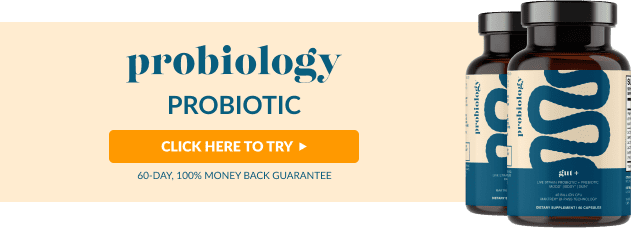Many different things have an effect on your body and your gut. Whether it is certain foods, ingredients, caffeine or alcohol, it can all change how our body works and adapts. Keeping your gut happy is essential to your overall health and wellbeing.
Our gut microbiome is filled with good bacteria that ward off bad bacteria that can cause infections and illnesses.
If the bad bacteria overwhelms our gut, then problems such as diarrhea, constipation, gas or bloating can develop. To return your gut bacteria to a normal, healthy level, you can take probiotics and implement a healthy diet and lifestyle.
So, what about alcohol? How does this affect the gut, and does this have an adverse effect on probiotics? That’s what we are here to find out!
Drinking Alcohol & Taking Medication
If you have ever been on certain medications such as antibiotics, then you will have been told by your doctor to avoid alcohol while on the medication.
It is also recommended to avoid alcohol while using opiate pain medications, so why is this?
Well, consuming alcohol while taking various medications can have a detrimental impact on your health, and can cause some adverse side effects. But, what about alcohol and probiotics? Read on to find out.
Taking probiotics is a little different than taking medication. Probiotics are live bacteria, used to bolster your gut microbiome. They support the natural and vital processes in the body such as digestion, nutrient absorption and even cognition.
If you are taking probiotics to help aid your digestive system, and improve your gut health, then you will not want alcohol to interfere with this process. So, how does it affect the gut?
How Does Alcohol Affect The Gut?
Alcohol in general is rather bad for the body. As fun as consuming alcohol can be, it should only be done in moderation as it is a toxin for the body.
For instance, alcohol can impact your blood sugar levels, cognition, immune system and your digestive tract.
When you drink alcohol, your liver will need to work harder to clear out the toxins and waste from your body after consuming the alcohol.
Excessive alcohol consumption can be detrimental to the liver by causing fat deposition and inflammation. If toxins are not cleared adequately through the liver, they can build up and lead to damage in other organ systems.
In addition to this, alcohol in high concentrations can also kill off the good bacteria in your intestines, especially if consumed in large quantities.
Now, despite bacteria sounding like a bad thing, you actually need a lot of good bacteria for your body to function. Without good and beneficial bacteria, your digestive system and immune system may not work properly.
In short, our bodies need a lot of good bacteria to support a healthy gut microbiome, so that critical functions and processes can work efficiently.
When the good bacteria in your digestive tract is destroyed (by alcohol), the bad bacteria begins to flourish. This leaves your body more susceptible to pathogenic viruses and bacteria.
When there is an influx of bad bacteria instead of good bacteria in your gut, this is called dysbiosis. Someone with dysbiosis can suffer from IBS or several other chronic medical conditions like bacterial overgrowth, obesity, and diabetes.
- Read More: Best Alcoholic Drinks for IBS
Leaky gut syndrome is a popular term to describe a situation in which the intestinal barrier has become inflamed, breaks open and becomes leaky. Harmful viruses and bacteria in your gut can then be more successful at entering the bloodstream and causing harm.
This may result in infection, or at the very least, immune system activation. As a result, people with dysbiosis can often suffer with many chronic illnesses.
To prevent dysbiosis, many people use probiotics to rebalance the gut microbiome
What Are Probiotics?
Probiotics are essentially live bacteria that are beneficial to the digestive system. This good bacteria helps to keep your gut in check, and return it to its normal balance.
Probiotics are often found in things like yogurts or food supplements so that you can consume them to improve your gut health.
These live microorganisms are used to increase and maintain the good bacteria and normal flora of your body. But, what happens if you drink alcohol when using probiotics?
Can You Drink Alcohol While Using Probiotics?
Drinking alcohol while using probiotics will not have any adverse effects on your health, and is not like drinking alcohol with medication.
Nothing really will happen if you consume alcohol while taking probiotics. So, technically yes you can drink alcohol along with probiotics.
However, it may impact how efficient your probiotics are, because as previously stated, alcohol can be toxic to the body and can kill off good bacteria in the digestive system.
Not only will alcohol kill off any good bacteria in your intestines, but it will likely destroy some of the good bacteria in the probiotic supplement you have been taking.
Therefore, it seems counterintuitive to drink alcohol and use probiotics, as you are just undoing the good that the probiotics are doing.
That being said, it does depend on how much alcohol you are consuming. For instance, one drink here and there will not have a huge impact on your gut health or the efficacy of the probiotics.
But, on the other hand, drinking excessively can affect your gut flora, liver and overall health. You may also feel constipated due to the dehydration effect.
You can try to reduce the adverse effects of alcohol on the probiotics by ensuring that you take your probiotics long before or after you have consumed the alcohol.
To prevent an interaction, your best bet is to take probiotics in the morning before or with your first meal of the day. This gives the probiotics plenty of time to reach the bowel and have lots of healthy benefits.
In short, alcohol can kill off good bacteria in the body whether it is naturally occuring, or probiotic bacteria. Therefore, drinking alcohol can reverse the good effects of using a probiotic supplement, Make sure that you do not consume both at the same time.
Which Probiotics Are Best For Me?
There are so many different types of probiotics that it can be hard to know which is best for you. Most probiotic supplements are made up of different bacterial species and strains, and often include ones such as Lactobacillus and Bifidobacteria, which have been shown to be helpful for the gut.
Different bacteria have different functions in the body, and some work better than others depending on what you need them for. If you have any questions, seek advice from a medical professional, or your doctor.
These are good probiotic options:
- Probiology Probiotics + Prebiotics
- Align Probiotic Capsules
- Culturelle Probiotics Capsules
- Activia Probiotic Yogurt

Alcohol and Probiotics Final Thoughts
To conclude, drinking alcohol can have an effect on the probiotic bacteria inside of your gut microbiome. It can alter the delicate balance of your gut bacteria, which may lead to or exacerbate your IBS symptoms.
Taking probiotics can be beneficial for your gut, but doing so while drinking heavy amounts of alcohol is counterproductive, and will not benefit you in any way. However, it will not cause a bad interaction in most cases.
It is best to drink probiotics in the morning before drinking alcohol, so that the probiotics have time to work their wonders.
Then, if you drink alcohol responsibly in the evening, you should also take probiotics the next morning to ensure that your gut flora is restored and healthy.
Check out these other related articles:



